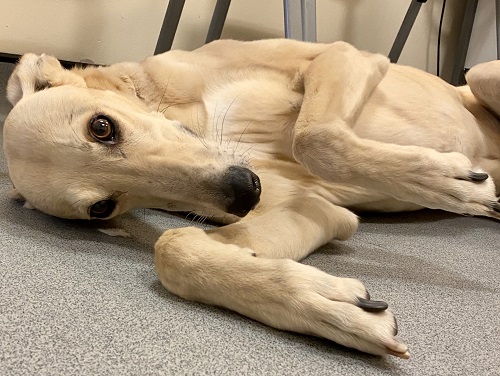RVC names “Pet Blood Donors of the Year” this World Blood Donor Day
Superhero Pets: the RVC names “Pet Blood Donors of the Year 2023” this World Blood Donor Day
In celebration of World Blood Donor Day (14 June), the Royal Veterinary College (RVC) has announced its Pet Blood Donors of the Year 2023. These awards honour cats and dogs that participate in its vital blood donor programme to help other furry friends in need. The RVCs registered charity, the RVC Animal Care Trust, has awarded the families of one canine and one feline blood donor a “Blood Donor of the Year” award in recognition of their generosity and participation in its life saving programme. Each year, those involved in the blood donor programme save and treat hundreds of other pets by donating their blood to be used in operations and procedures at the RVC Queen Mother Hospital for Animals. The RVC Animal Care Trust fund both vital equipment and research to support the RVC Blood Donor service.

The feline Blood Donor of the Year was awarded to Paul Downey from Hatfield in Hertfordshire and his two cats Gru and Mitzy. These seven-year-old domestic shorthairs have been donating since 2016. Since then, Gru has donated eight times and Mitzy six times, collectively helping as many as 28 cats receive treatment. Both cats have Type B blood, a rare blood type only found in 20 per cent of cats. Due to the difficulty finding Type B donors, cats with this blood type who will need a transfusion during treatment are referred to the RVC. Having cats like Gru and Mitzy as participants in the blood donor programme is particularly useful as they remain on call to donate as needed.
Paul, owner and recipient of the Feline Donor of the Year award, said:
“We had a cat a few years ago who came to the RVC for cancer treatment. Until then, we had no idea about pet blood donors and how vital they are for treating sick pets. Initially, our dog Gizmo became a donor – and then the staff were so friendly and fantastic with him that we started to bring our cats too!. As well as doing something good, our cats get a healthcheck everytime they donate so that’s very reassuring”
The canine Blood Donor of the Year was Oliver, an eight-year-old Lurcher who belongs to Jeffrey and Glenys Kenyon from Chipping near Buntingford in Hertfordshire. Oliver has donated 18 units of blood since he joined in 2018, helping at least 36 dogs in additional to several cats.
Jeffrey/Glenys Kenyon, owner of Oliver recipient of the Canine Donor of the Year award, said:
“We had a seriously ill German Shepherd called Saffron who was admitted to RVC Queen Mother Hospital. We saw the request for new pet blood donors on the screen in reception area and decided there and then we would apply for our other dog – Oliver to donate. Oliver is short for ‘Oliver Twist’ as we acquired him from a local vet as a rescue dog (he had been found tied up and abandoned and was severely malnourished). Oliver went in for an eligibility and health assessment and was so good with the nurses that they decided to take a blood donation there and then. We are delighted he has been given this award”.

Since its conception in 2005, thanks to the brave feline and canine donors, the RVC’s blood donor programme has helped save hundreds of critically ill animals, with 684 transfusions in the last year. Feline blood product transfusions hit an annual record number with 135 feline transfusions in the last 12 months and the team have also conducted 549 canine blood product transfusions and 55 xenotransfusions (canine blood being given to cats in emergencies). The generosity of all blood donor families allows the RVC’s animal hospitals to continue accessing the essential blood needed to perform a wide range of complex and life-saving operations and treatments that take place at the RVC every day.
Charlotte Russo, Head of Transfusion Medicine Nurse at the RVC, explained:
“Our voluntary donation programme is totally reliant on the goodwill of local pet owners who bring their pets to donate blood. All donors are given health checks prior to donating and receive a full blood screening annually free of charge. All donors are also gifted a special blood donor tag in recognition of their support and receive a special gift when they retire”
The RVC blood transfusion team is always looking for more dogs and cats to begin donating and saving lives through the programme.
If you think your pet could be an RVC superhero, please contact the RVC Blood Donor team for further information: https://www.rvc.ac.uk/pet-blood-donations
Notes to Editors
For media enquiries, please contact:
- Jasmin De Vivo (jasmin.devivo@plmr.co.uk) or rvc@plmr.co.uk
- Press Line: 0800 368 9520
About the Royal Veterinary College
- The Royal Veterinary College (RVC) is the UK's largest and longest established independent veterinary school and is a Member Institution of the University of London.
- It is one of the few veterinary schools in the world that hold accreditations from the RCVS in the UK (with reciprocal recognition from the AVBC for Australasia, the VCI for Ireland and the SAVC for South Africa), the EAEVE in the EU, and the AVMA in the USA and Canada.
- The RVC is ranked as the top veterinary school in the world in the QS World University Rankings by subject, 2023.
- The RVC offers undergraduate and postgraduate programmes in veterinary medicine, veterinary nursing and biological sciences.
- The RVC is a research-led institution, with 88% of its research rated as internationally excellent or world class in the Research Excellence Framework 2021.
- The RVC provides animal owners and the veterinary profession with access to expert veterinary care and advice through its teaching hospitals and first opinion practices in London and Hertfordshire.
About the RVC Animal Care Trust
- The Animal Care Trust supports the RVC hospitals that treat and care for over 30,000 animal patients a year by providing funds for new equipment and enhanced facilities.
- The Animal Care Trust supports clinicians and scientists of the future, invests in the development and application of scientific research, funds pioneering work in animal and human health, and assists research projects carried out by RVC researchers and undergraduate and postgraduate students.
- https://www.rvc.ac.uk/act
You may also be interested in:
-
RVC Students Among Top Three in BSAVA Research Project Competition
Two RVC students were placed in the top three in the BSAVA’s Companion Student Research Project …

